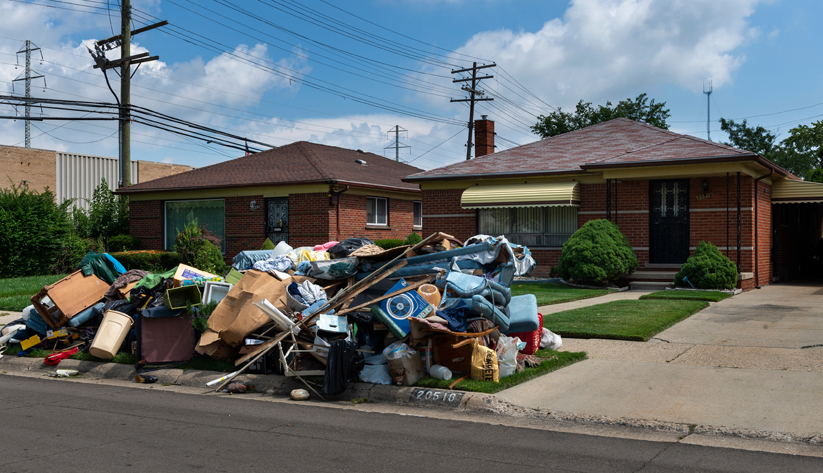
Community advocates expect an increase in eviction filings following a US Supreme Court ruling in late August that nullified a Centers for Disease Control and Prevention (CDC) moratorium that had been in effect for nearly a year.
Laura Tuggle, executive director of Southeast Louisiana Legal Services, which provides free assistance to low-income people, is expecting her office's case volume to rise even more now. "We are really bracing ourselves for a deluge" of eviction filings, she said. Tuggle is hoping her agency will be able to work out payment arrangements for most of the clients it represents.
Recent analyses of case filings and data from the Federal Reserve Bank of Atlanta's coverage area, which includes the states of Georgia, Florida, Alabama, and parts of Mississippi, Louisiana, and Tennessee, suggests lower-income residents and communities of color could be the most adversely affected as eviction filings pick up.
An Atlanta Fed review of five metro Atlanta counties found the highest rates of eviction filings since the start of the COVID-19 pandemic took place in areas that were majority low-income and had greater concentrations of households headed by Blacks and other people of color. Though this trend was evident before the pandemic, it became more pronounced during the health crisis.
Eviction filings slowed in wake of bans
Effective bans on evictions mandated by the federal Coronavirus Aid, Relief and Economic Security (CARES) Act in early 2020 curbed filings but did not bring them to a full stop. The Atlanta Fed study showed that eviction filings fell in April 2020 and stayed at low levels through July 2020, when the CARES moratorium ended. The CDC moratorium took effect in September 2020 and ended by court order on August 26, 2021.
"There are well documented disproportionate impacts that COVID-19 is having on people on color," said Sarah Stein, an adviser in the Community and Economic Development group at the Atlanta Fed who is part of the team that researched eviction filings. "From this analysis, we think that the pandemic was causing a disproportionate hardship on households of color as far as rent vulnerability and housing affordability are concerned."

The Atlanta Fed's Sarah Stein. Photo by David Fine
Looking at other parts of the Southeast reveals a similar story in terms of the populations affected by evictions. Studies of data from Louisiana and Florida show eviction filings have been higher for tenants of color than White renters.
In New Orleans, an examination of data from the First City Court of Orleans Parish concluded that local, state, and federal moratoriums likely averted 2,492 eviction filings in the Crescent City between March and November 2020. "What we documented is that evictions disproportionately impact neighborhoods that are predominantly occupied by African Americans," said Davida Finger, a law professor at Loyola University New Orleans who is one of three authors of a study on the city filings.
The federal government allotted $46 billion in emergency funds to assist tenants at risk of eviction, but the assistance hasn't been getting to renters quickly enough. The Treasury Department disclosed that $7.7 billion had been disbursed as of August 31. "There is a prevailing feeling by tenants and tenants' rights advocates that the government programs are not moving fast enough," Finger said.
Now that the Supreme Court has struck down the CDC eviction moratorium, community advocates are hoping lawmakers will act to speed up disbursement of the rental assistance funds. Still, even expedited money might not be enough to keep many people from being put out on the street.
The nonprofit Aspen Institute noted in a July report that more than 15 million people live in households that were behind in their rent payments. It noted that the eviction threat was especially serious for minorities, as 22 percent of Black tenants and 17 percent of Latinx renters were in arrears, compared with 11 percent of White renters.
Should evictions of that magnitude materialize, a host of problems could follow. Before the pandemic, many parts of the country were grappling with a dearth of affordable housing that worsened throughout the health crisis. A separate Atlanta Fed analysis completed last year estimated that more than a million renter households across nine metro areas in the Atlanta Fed's territory could be vulnerable to job loss from COVID-19. Of those households, 51 percent were spending more than 30 percent of their income on housing, and nearly 88 percent earned less than $50,000 a year. That study also determined that more than two-thirds of those vulnerable renter households identified as a race other than White.
"Now that the federal eviction moratorium has been overturned, places without local protections will likely begin to see both an increased number of eviction filings and increased processing of the backlog of eviction cases that were previously halted in the courts," said Stein of the Atlanta Fed.
"Although there are unprecedented amounts of emergency rental assistance funds available from the federal government, local and state programs are still ramping up their capacity to reach struggling tenants and process applications in time to avoid evictions," Stein added. "There is a very real possibility that many people who urgently need those funds as a result of the moratorium ending will not have time to access them before their eviction case makes it through the court system."
Demand for apartments increases along with rents
Alongside the potential increase in evictions, housing and rental markets have tightened. Brian Bailey, a subject matter expert for commercial real estate in the Atlanta Fed's Supervision, Regulation, and Credit Division, explained that pandemic lockdowns, the eviction moratorium, slowing construction, rising home prices, and limited housing inventory combined to boost demand for apartments in the past year. As a result, rental markets are tight, with occupancy rates and asking rents for multifamily dwellings climbing (see the chart) for all classes of properties at the same time home prices have reached record levels. "We have a shortage of affordable housing, and that's not going to change anytime soon," Bailey said.
In the Southeast, residents in Florida face some of the steepest increases in rent. New apartments in cities such as Orlando are out of reach for the people who primarily work in the city's lower-wage tourism jobs. "Orlando is an area that used to be an affordable place to live, but rents have skyrocketed while wages have grown much more slowly," said Anne Ray, manager of the Florida Housing Data Clearinghouse at the University of Florida's Shimberg Center for Housing Studies. A media study of court filings in Central Florida completed in consultation with Shimberg showed that evictions were concentrated in neighborhoods with large numbers of African-American renters, she said.
 The Atlanta Fed's Brian Bailey. Photo by David Fine
The Atlanta Fed's Brian Bailey. Photo by David Fine
With the resumption of evictions, fears are growing that fallout from the unstable housing situation could increase homelessness, force people to double up in living quarters with friends and relatives, and leave many saddled with hefty rent debt that could take years to pay off and further limit their economic mobility and resilience. With some tenants as much as six months to a year behind in rent, "we are very concerned about the long-term impacts on people's credit and their ability to rent housing, their ability to access capital in the future," said Tuggle. She also cited concerns that some landlords may resort to filing lawsuits over unpaid rent in an effort to win monetary judgments that then could be used to garnish wages of tenants in arrears.
"Nobody knows what is going to happen," Tuggle said.
By Karen Jacobs for Economy Matters



